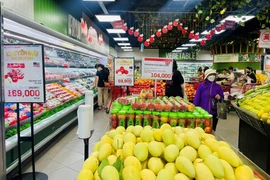Hanoi (VNA) – Vietnam's domestic market still holds significant untapped potential, and stimulating domestic consumption is a vital strategy to drive economic growth in the near future, according to economic experts.
The government has implemented various policies to boost economic development, focusing on three key drivers, namely investment, consumption, and exports. Besides, developing the domestic market is a crucial pillar of this "three-horse carriage for growth".
Economist Vo Tri Thanh emphasised that regional economic development is a major asset for expanding the domestic market. Vietnam's domestic market underpins the retail sector, offering a diverse range of goods for local consumption. The proximity of suppliers reduces transportation costs, making it an attractive area for further investment. Thanh described it as a "gold mine for consumption," appealing to both domestic and foreign investors eager to expand their distribution networks.
In southern Vietnam, the Southeast region stands out as an economic powerhouse. With its large industrial hubs, major seaports, and densely populated areas, it holds immense potential for developing the domestic market. The region also represents a significant consumer base for agricultural products produced locally and nationwide.
Ho Chi Minh City, as Vietnam's largest distribution hub, boasts extensive infrastructure and bustling commercial activities, including wholesale markets supplying over 60% of the city's fresh produce, supermarket chains, and convenience stores. These factors enhance local distribution capacity and foster regional growth.
Nguyen Nguyen Phuong, Deputy Director of the municipal Department of Industry and Trade, highlighted the city’s success in attracting leading retail corporations to invest in supermarkets and distribution networks, particularly for agricultural products. For example, HCM City alone consumes around 10,000 pigs per day, along with large quantities of vegetables, fruits, rice, and other agricultural goods.
The Ministry of Industry and Trade has also reaffirmed its commitment to the "Vietnamese People prioritise Vietnamese goods" campaign. Minister Nguyen Hong Dien noted that the campaign has fostered a culture of Vietnamese consumption, encouraging local enterprises to produce high-quality, competitive goods for both domestic and export markets. This has led to significant improvements in product quality, technology, and branding, strengthening consumer trust in Vietnamese products.
The domestic market serves as a reliable foundation for Vietnamese enterprises, offering a multi-layered and segmented consumer base. It also acts as a safety net during export disruptions, providing critical support for export-oriented industries.
Dr. Nguyen Quoc Viet, Deputy Director of the Institute for Economic and Policy Research (VEPR), emphasised that domestic commerce and consumption will remain key drivers of economic growth in 2024. To sustain this momentum, industries and local governments must prioritise initiatives that stimulate trade and services within Vietnam, thereby bolstering local production and supporting businesses.
Recognising the importance of regional collaboration, Phuong highlighted Ho Chi Minh City's partnerships with neighbouring provinces like Dong Nai, Binh Duong, and Long An to facilitate the distribution of agricultural products. For instance, enterprises in Dong Nai excel in producing livestock, poultry, eggs, fruits, and vegetables.
Much of their production is professionally managed but often outsourced to larger brands. Rigourous quality control processes ensure safe food supplies for consumers and aid state management agencies in maintaining food safety standards, he added./

See more

Lumitel – A bright spot in Vietnam-Burundi collaboration
After a decade of operations, Lumitel has become the leading telecommunications provider in Burundi and one of the largest contributors to the Burundian government's budget, providing stable employment for over 60,000 workers and indirectly creating around 100,000 jobs.
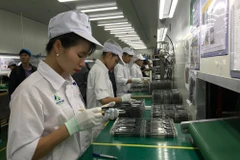
Vietnam’s trade shines as a pillar of economic growth
This robust performance, representing an additional 12 billion USD compared to the same period last year, underscores trade's resilience amid global economic uncertainties.

Ample room remains for Vietnam - Belarus trade cooperation
To further develop the Vietnam-Belarus economic and trade relationship, it is essential to enhance trade promotion and investment initiatives such as trade fairs, forums, thematic workshops, and trade connections, which serve as an important bridge for businesses from both sides to meet, connect, and seek cooperation opportunities.

Reference exchange rate up 3 VND on April 3
The State Bank of Vietnam set the daily reference exchange rate for the US dollar at 24,854 VND/USD on April 3, up 3 VND from the previous day.

Vietnam, Laos boost trade at Savannakhet expo
Vice Governor of Savannakhet Saensak Soulisak highlighted the exhibition’s role in expanding trade collaboration, enabling businesses to connect, share experience, and explore investment prospects. He also noted its significance in promoting local products to a wider market.

Vietnam’s seafood exports surge to 2.45 billion USD in Q1
Industry insiders pointed to stable raw material prices and a strategic shift towards higher-value processed products as key factors underpinning the strong performance of the two top earners -shrimp and tra fish.

Vietnam sets new framework for retail electricity pricing
The decision, signed on March 31, sets the maximum retail electricity price at 2,444.09 VND per kWh (0,095 USD), while the minimum price is set at 1,826.22 VND per kWh.

Vietnam Expo 2025 opens, spotlighting digital transformation, innovation
This year’s edition, themed “Step together in a digitised world,” has attracted around 400 businesses from 18 countries and territories, with over 500 booths. Alongside traditional networking, it introduces online business-to-business (B2B) matching, enabling year-round connections.

Private sector encouraged to join major national programmes, projects
It must fully unleash the productive capacity and resources of the country through the private sector; mobilise all private resources for national development; harness the effectiveness of internal forces, including human, natural resources, history, and culture, while effectively combining them with external resources such as capital, technology, human resources, and management experience, he said.

Annual Vietnam-Cambodia business dialogue held in Cambodia
The annual business dialogue in Cambodia attracted around 150 delegates, including Vietnamese businesses and Vietnamese-origin companies operating in Cambodia across various sectors such as finance, banking, insurance, telecommunications, agriculture, construction, interior design, food services, transportation, logistics, trade, healthcare, and tourism.
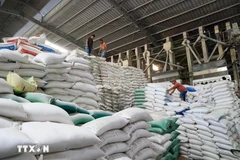
Vietnam-Cuba Business Forum held in Hanoi
Addressing the event, Cuban Ambassador Rogelio Polanco Fuentes affirmed that Cuba will always stand alongside the Vietnamese Government and business community in their efforts to achieve the challenging target socio-economic goals.

Da Nang, RoK's Pyeongtaek partner in semiconductors, high technology
By the end of 2024, the RoK had invested in 285 projects in Da Nang, with a total registered capital of 382 million USD, ranking among the top five foreign investors in the city.
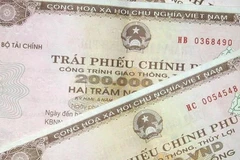
Over 2.54 bln USD raised through government bond auctions
These auctions raised an impressive 65.3 trillion VND (over 2.5 billion USD), an 124% increase compared to February, signaling strong investor confidence in the country's financial stability.

Party official anticipates breakthroughs in private economic sector
With the Politburo set to issue a dedicated resolution on the private economic sector, there should be a reformed approach to action plans, according to Secretary of the Party Central Committee and head of Head of its Commission for Policies and Strategies Tran Luu Quang.

More RoK’s game developers target Vietnam
Over half of Vietnam's nearly 100 million population being gamers and the country's competitive labour costs are among reasons for Korean gaming firms' expanding presence in Vietnam.

Airfares surge ahead of April 30 - May 1 holidays
To regulate the market, the CAAV has taken measures to balance supply and demand on domestic routes and support airlines in enhancing their operational capacity.

Vietnam cuts import taxes on key goods ahead of US tariff announcement
The quick response from Vietnam has won approval from industry leaders, with some considering the tax cuts as a "swift, positive, and timely" move that showcases Vietnam’s goodwill.

Vietnam Airlines marks 10 years of UK route operations
Vietnam Airlines launched its direct UK route in 2011, initially operating from London Gatwick Airport (LGW) before transitioning to Heathrow in 2015, improving connectivity to one of the UK’s major international hubs./.
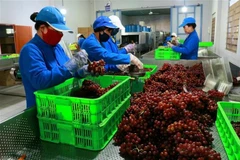
Vietnamese firms embrace green, digital export strategy to meet global standards
Nguyen Dinh Tung, CEO of Vina T&T Import Export Service Trading Co. Ltd., stressed that tougher technical barriers in global markets are creating a level playing field, compelling exporters to prioritise quality and compliance.

Seminar helps boost Vietnam - India e-commerce cooperation
The seminar, titled “Vietnam - India Collaboration in Cross-border E-commerce,” looked into both opportunities and challenges for Vietnam-India e-commerce cooperation.


